- Home
- Mary Stewart
Rose Cottage Page 2
Rose Cottage Read online
Page 2
Then came Gran’s telephone call.
I was working in the potting rooms behind the shop. We had just had a delivery of pot plants, and I was unpacking them, when one of the young sales assistants came running in.
‘Phone for you, Kate. Long distance, so hurry.’
I set down the pots I was holding, and wiped my hands hurriedly on the tissue wrapping. ‘Who is it, do you know? The Dutchmen, I hope? Those bulbs should have been here a week ago.’
‘I don’t think so. Moddom says it’s private. It’s in her office, and so’s she.’ ‘Moddom’ was the junior help’s name for Angela Platt-Harman, the owner of Platt’s Plants, and my employer.
‘Oh dear,’ I said. We were not supposed to make or take private calls at work, but my apprehension was only a token, a kind of expression of solidarity with my co-employees. In the workplace Angie and I were always, carefully, employer and employed.
‘It’s all right, she didn’t look mad.’ She hesitated. ‘I was in the office when she answered it, and she sent me to find you. It’s Scotland. Doesn’t you family live there? I hope it’s not—’
I didn’t wait to hear what she hoped it wasn’t. I ran to the office.
Angie was speaking into the telephone. ‘No, it’s no trouble. Quite all right, really. Ah, here she is now. Just a moment.’ She covered the receiver with her hand. ‘Kate, it’s your grandmother, but don’t worry, she says there’s nothing wrong.’ She handed me the receiver and pointed me to the chair behind her desk. ‘Take your time. I’ll see to the shipment.’ She went out of the office.
I sat down. ‘Hullo, Gran? How lovely to hear you. How are you? When they said it was Scotland, I was afraid there might be something wrong. Are you all right?’
‘I’m well enough.’ It seemed to me, though, that there was a quaver in the old voice that told of some distress or urgency. ‘It’s all a lot of fuss, nothing but a touch of flu, and you know how it goes to my stomach, and the fool of a doctor says I’m not to go back to work for a bit yet, but I’m fine now, and come the month-end I’ll be back at the House. That Morag may fancy herself at the clootie dumplings and broth and such, but she’s a lot to learn afore she can dress a fish properly, or put a dinner on when they’ve company.’
‘Don’t you worry about that, Gran. They’ll do all right at the House. Just get yourself better, that’s what matters. But hang on a minute, I didn’t know you’d been ill. What is it? You said stomach trouble? What does the doctor say?’
‘Never mind that now. This is dear, phoning. I know I didn’t ought to have called you at work, but I can’t get to a phone in the evenings, and you and I’ve got to have a real talk, and not on the phone. What I wanted to ask you – Kathy, hen, when do you get your holidays?’
‘When I ask for them. I’m due some time, anyway. Do you want me to come up now, Gran? Of course I will! I can look after you if you’re supposed to rest. In fact I’d love to come. London’s horrid in June. Can they have me? Will I be in my old room?’ My room had been a small attic at the House, with no mod cons, but with a breathtaking view over the whole length of the glen, right to the distant gleam of the sea loch.
‘No, didn’t I tell you? I’ve got my own place now. I’ve got Duncan Stewart’s house, down by the burn-side. You’ll mind the one, with the wee garden that used to be the kailyard.’
‘I remember it. How lovely! No, you didn’t tell me.’
‘Oh, well, you know I’m not much of a hand at writing, and it’s a long way to the post office for the telephone, and my legs aren’t so good these days.’
‘Are you phoning from there now?’
‘No, from the hospital. Now don’t fret yourself, I’m going home tomorrow, and Kirsty Macdonald – you mind her, she has the house next door – says she can look after me fine. But there’s something I want to talk to you about, Kathy love, and something I want you to do for me. It’s important, and it won’t wait. No, not on the phone, hen, the girls at the desk hear everything. It’ll keep till you get here. It’s about Rose Cottage – you do remember Rose Cottage, don’t you? Well, then, can you really come?’
‘Of course I can. I’ll go and see the boss now, and I’ll be with you some time at the weekend. Take care, Gran, won’t you? ’Bye, then. Love.’
I cradled the receiver, then lifted it again and got the number of the Lodge. It rang for a long time before a woman’s breathless voice answered it.
‘Hullo? Strathbeg Lodge.’
‘Hullo. Is that Mrs Drew?’
‘Speaking. Sorry to keep you waiting. I was out in the garden with the children. Who is it, please?’
‘Oh, madam, it’s Kate Herrick. Kathy Welland. I’m sorry to trouble you, but I was worried about my grandmother. She’s just rung me up from the hospital, but she won’t tell me much about it. I gathered it was some sort of gastric flu, but I did wonder if she was all right? Do you know about it?’
‘Kathy, how nice to hear from you. Yes, your grandmother did have to go into the Cottage Hospital last week. She’s been off colour for some time now, but she wouldn’t admit to anything, so in the end Dr McLeod sent her in, really just for a rest, and he said while she was there they’d do some tests.’
‘Tests?’ Somehow the word held a world of fearful speculation.
‘Yes. These stomach upsets she’s been having lately. Didn’t she tell you? I think they were wondering about an ulcer. William, take that puppy out of here at once, at once – oh, hell, now see what’s happened! Go and get a cloth. I don’t know, ask Morag – no, do not ask Morag to do it, do it yourself. I’m so sorry, Kathy. I was saying. Your grandmother is coming home tomorrow, and I think we’ll hear in a week or so if there’s anything wrong. But really, she was just a bit tired and run down, with something like a mild flu, but Dr McLeod thought she should go in for examination. I don’t honestly know any more, but if you’d like me to keep you in touch – you’re coming up? Oh, great, that’ll do her more good than anything else. Dear God, there’s that puppy again. William! William! When will you get here, Kathy? Saturday night? I’ll ask Angus to meet the train, shall I?’
‘That’s very kind of you, madam. Is her ladyship well?’
‘Very well. We all are. I’ll tell her you were asking. And do come and see us. Mother will be so pleased.’
So it had been arranged. Angie had been kind, the train had run on time, Angus had met it with the pony-trap, and I had found Kirsty in capable charge at Gran’s cottage, with Gran herself in bed, and so relieved and happy to see me that she had gone almost straight to sleep. In the morning, with a visit from the district nurse and calls from two neighbours on their way home from the kirk, and Kirsty’s busy presence, there had been no time for any private talk with Gran. The nurse, when I questioned her, was so professionally discreet that I was sure she knew nothing. Kirsty went back next door at lunchtime and I took Gran her soup and toast, but she looked tired, so when I went up to collect the dishes I smoothed the quilt over her, drew the curtains, and left her to sleep.
Then walked up the hill to sit in the sun and listen to the curlew’s song.
3
Gran was sitting up against her pillows when I went upstairs after washing the supper dishes and saying goodnight to Kirsty, who had eaten with us.
‘Well, and did you have a nice walk?’
‘Lovely. How are you feeling now, Gran?’
‘I’m fine. Now pull that chair up where I can see you properly. Hm. Very smart, I’m sure. Where’d you get that skirt, London? So they have tartans there now, do they?’
‘England’s pretty civilised these days. But you’ve had me worried, you know. What’s it all about? If you say you’re not really ill—’
‘I’m not. I’ll be up and about again in a wee while, but I can’t say I’m not glad of a bit of a rest just now. It’s a lot of standing, cooking, and my legs aren’t as good as they were. Once this stomach’s settled, I’ll be as good as new, forbye a bit of the rheumatism when the weather’
s no’ right.’ A trace of her girlhood’s accent had come back, I noticed, to mix quite kindly with the familiar North-country lilt.
‘You want to go back to work? Truly? You don’t have to, you know.’
‘What would I do with myself if I didn’t? Nay, lass, we’ve had all this out and settled, so say no more. I’m as well here as I’ll ever be, with folk I know, and with you coming home when you get your holidays, and the family for ever in and out of the door. It suits me fine, for all I miss Todhall and the folks there. Now tell me about yourself and this grand London job, for all I’d have thought you should have something better than working in a shop.’
It was plain that, whatever she had to say to me, she would say it in her own time, so I stifled my curiosity and told her as much of my London news as I thought would interest her. I had only seen her once since my marriage, a flying visit in the summer of 1945, as soon as term ended, to tell her about Jon and that I was giving up my school job and going, at any rate until our affairs were sorted out, to London. I had offered to stay with her at Strathbeg, but, predictably, she would not hear of it. I must make a new life for myself now among my new friends (she meant, but did not say, ‘better myself’) and try to let time heal the wounds of war. Not that she put it like that, but once again I knew what she meant; ‘stay where you’re more likely to meet somebody else when you’ve got over it.’
I knew she was hoping that this would be my news, but she bore very well with the daily doings at Platt’s Plants, and then in her turn she brought me up to date with the happenings in the glen, and the affairs of the family at the House.
‘I phoned them,’ I told her, ‘and Mrs Drew asked me to go over and see them.’
‘Well, of course you have to. Her ladyship’s always asking after you. She’ll tell you about it herself.’
She was not looking at me as she spoke, but at something beyond the bedroom window. Not the blue hilltops of the summer evening; something further away even than they.
We had come to it at last. I said gently, ‘Tell me what?’
The roughened hands moved on the quilt. ‘It was something I heard not long syne. Something the family are doing at Todhall.’
‘Yes? Do you mean them turning the Hall over into a hotel? I heard that, too; in fact, I think they’ve already started.’
‘Aye, they have. Annie Pascoe wrote me. Jim and Davey are working there.’ Jim Pascoe was the Todhall carpenter, and Davey was his son. His wife, ‘Aunty Annie’ to me since childhood, was my godmother.
‘Do you mind very much, Gran?’
‘What’s the use of minding?’ Recovering herself, she was brisk. ‘It was a nice house, and I liked my kitchen – better than the one I’ve got here – but it had to come, and I’m well enough myself back here in the glen, and now with my own home. No, it’s not the Hall, it’s the house. Our own house. Rose Cottage.’
‘What about it? Do you mean they’re altering that as well? Or are they selling it?’
‘Not selling it, no, not yet. But there was talk of converting it – making one of those hotel places where folk fend for themselves, I forget what they call them.’
‘Annexes? Self-catering cottages?’
‘That would be it. Like a hotel, but you do your own cooking. So if our cottage has to be made over, they’ll be making big changes there, too.’
‘I suppose they’d have to, yes, surely. There’d have to be a better bathroom, and I dare say they’ll put an electric cooker in, and a few other things, like a fridge and a washing machine? But Granddad always said the building was sound, so they won’t have to pull any of it down, will they?’
‘That’d be enough, the electric stove, I mean. They’ll be taking the fireplace out for it, or if they make the back-place into one of those wee kitchens – kitchenettes, they call them’ – the word held a world of scorn – ‘they’ll surely take out my old kitchen range and put a sitting room fireplace into the front room.’
‘I suppose so. Gran, do you mind very much? I think – yes, I think I’ll mind, a bit. And it was your home and Granddad’s for all those years. You weren’t hoping to go back one day, were you?’
She wasn’t listening. A hand moved, briefly, to touch my knee. ‘So that’s it, Kathy. That’s why I asked you to come.’
‘I don’t see—’
‘Listen. You never knew it, and nor, thank the good Lord, did your Aunt Betsy, but just aside the fireplace, on the left near the mantelshelf, there’s a cupboard let into the wall.’
‘Is there? Really? I never saw one.’
‘No, you wouldn’t, not without you knew where to look. Not to look, at that, but feel. It’s tiny, no more than a tin box built into the wall, and it’s been hidden – papered over – these many years. Do you mind the time we put that pretty paper on, with the autumn leaves and berries?’
‘Not really. Was it – yes, wasn’t it soon after Granddad died, just before Aunt Betsy came to stay? You and – you did it yourself, didn’t you?’
‘That’s right. Lilias and I did it together.’ A silence, that I took care not to break. After a while she said, heavily, ‘For all that your Granddad was gone, that was a happy time.’
I waited. When she spoke again she was answering, I knew, what had not been said.
‘And then Betsy came. She was a good woman, your great-aunt, make no mistake about that, for all she was never one to be easy with. Nor to share secrets with, neither. So she never knew about the cupboard.’
‘Gran, you said to the left of the fireplace. Do you mean behind the picture there?’
‘I do. A holy text. Your aunt thought a lot of that text.’ A twinkle. ‘She was a tidy body about the house, your Aunt Betsy, and a good enough cook, but she was never great with the mop and duster. You might say that she dusted kind of reverent, without disturbing things, nor lifting them about, so she never noticed it. But I made sure. I only opened it up again the once, when she was from home, to put—’ – a pause – ‘to put Lilias’s bangle away. You’ll remember that. They sent it over from Ireland after the accident. It was all there was, and I didn’t want Betsy to see it, and maybe … Oh, well, never mind that. So then I made a real job of it, plastered it over nice and flat and matched the paper up, so if she ever did lift the picture down she’d not see anything, forbye a bit of a bubble in the pattern, where the keyhole is. Oh, it was safe enough, even at the spring-clean, or when we had to paper again. That’s what your granddad used to call it, “the safe”.’
I said slowly: ‘I’m getting there, I think. There’s something there still, in the “safe”?’
‘That’s right. In all the clamjamphrie of the flitting, and giving the family a hand with their gear, I never thought about it. Nor at the time when your Aunt Betsy was took. The district nurse came most days, and Annie Pascoe helped out when I needed it, and what with one thing and another I never gave a thought to the safe. Maybe I was still thinking we’d be back there one day.’ A sigh, and another look through the window at something far away and long ago. Then back to me. ‘So what’s there will still be there – that is, until they start pulling the fireplace out and find it.’
‘What is there, Gran?’
‘Family things. Not valuable, except maybe for the five golden sovereigns that Sir Giles, as was the Squire then, gave your Granddad on our wedding day, and which he’d never dream of spending, but all things I’d sorrow to lose. My ring that your Granddad gave me when we were promised, and the brooch my lady gave me for a wedding present, lovely it was, you’ve seen it, pearls and those green stones, I misremember the name.’
‘Peridots.’
‘That’s it. And there’s your Mum’s bracelet like I told you, and the letters your Granddad wrote me from France when he was fighting, if letters you can call them; one of them was written on a bit of cardboard torn off a box, and it got to me just as if it had been in a proper envelope, and registered at that. And his medals, he got two, and his watch and his wedding ring and a whole b
undle of papers – my marriage lines, and your Mum’s birth certificate and – well, all that sort of thing.’
‘My birth certificate, you mean?’
A silence.
‘It’s all right, Gran dear. I’ve seen it.’
‘You’ve seen it?’ She was sharp. ‘How?’
‘A copy, that’s all. I wrote to Somerset House for a copy. I wanted to see it for myself, and make sure. You see, I’d told Jon all about us – my family, I mean. I showed it to him. You do understand, don’t you?’
‘Aye,’ she said, ‘I do. And you did right.’ The clasped hands shifted on the coverlet. ‘Well, then, I don’t need to tell you you’d get nothing from that. He’s not on it.’
‘No.’ A pause, then I leaned forward to touch the old hands, lightly. ‘Gran.’
‘Eh, what now?’
‘Look, Gran, I’m not sixteen any more and still at school. I’ve been married and widowed, and I’m twenty-four, and people think differently, anyway, since the war. I know you’ve always said you didn’t know who he was, but if you’re just trying to save me from hearing something I won’t like—’
‘Kathy love, don’t. It’s true I don’t know. You have to believe me. She never told me. And guessing doesn’t get you anywhere.’

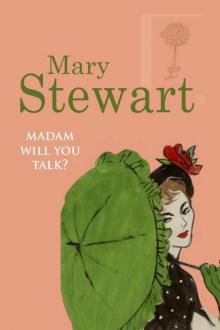 Madam, Will You Talk?
Madam, Will You Talk? Legacy: Arthurian Saga 1-4
Legacy: Arthurian Saga 1-4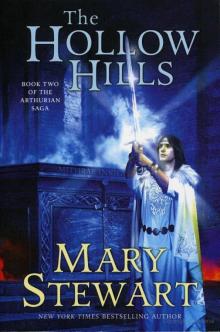 The Hollow Hills
The Hollow Hills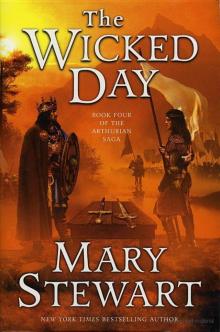 The Wicked Day
The Wicked Day The Last Enchantment
The Last Enchantment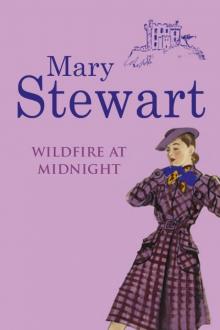 Wildfire at Midnight
Wildfire at Midnight The Crystal Cave
The Crystal Cave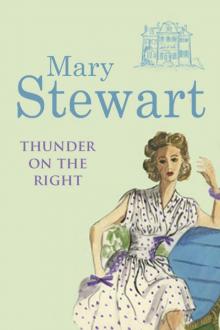 Thunder on the Right
Thunder on the Right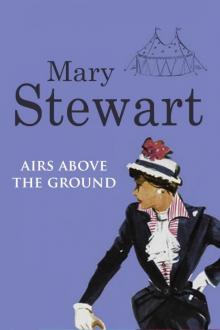 Airs Above the Ground
Airs Above the Ground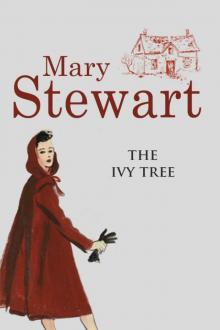 The Ivy Tree
The Ivy Tree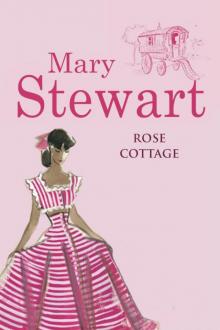 Rose Cottage
Rose Cottage The Gabriel Hounds
The Gabriel Hounds Legacy: Arthurian Saga
Legacy: Arthurian Saga The Wind Off the Small Isles
The Wind Off the Small Isles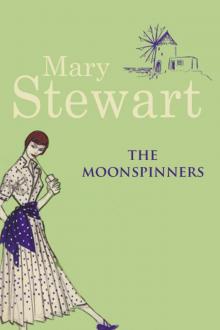 The Moonspinners
The Moonspinners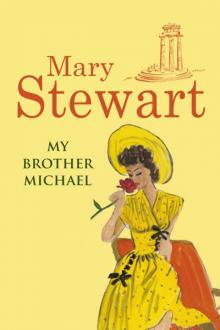 My Brother Michael
My Brother Michael The Prince and the Pilgrim
The Prince and the Pilgrim A Wlk in Wolf Wood
A Wlk in Wolf Wood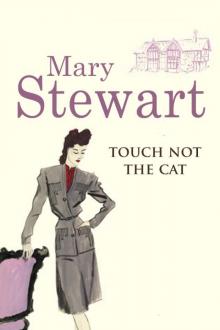 Touch Not the Cat
Touch Not the Cat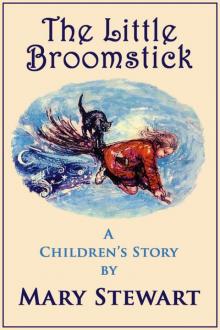 The Little Broomstick
The Little Broomstick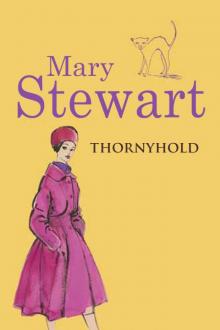 Thornyhold
Thornyhold This Rough Magic
This Rough Magic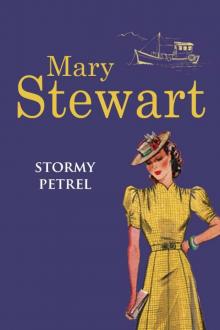 The Stormy Petrel
The Stormy Petrel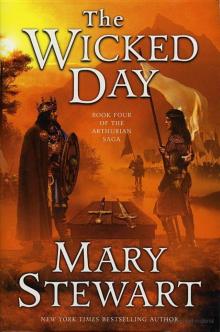 Wicked Day
Wicked Day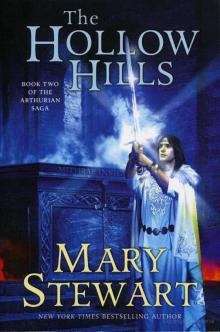 Hollow Hills
Hollow Hills WILDFIRE
WILDFIRE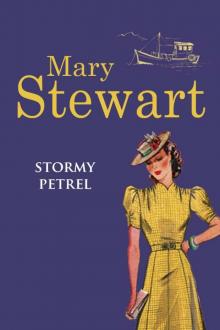 Stormy Petrel
Stormy Petrel Legacy
Legacy Crystal Cave
Crystal Cave Last Enchantment
Last Enchantment